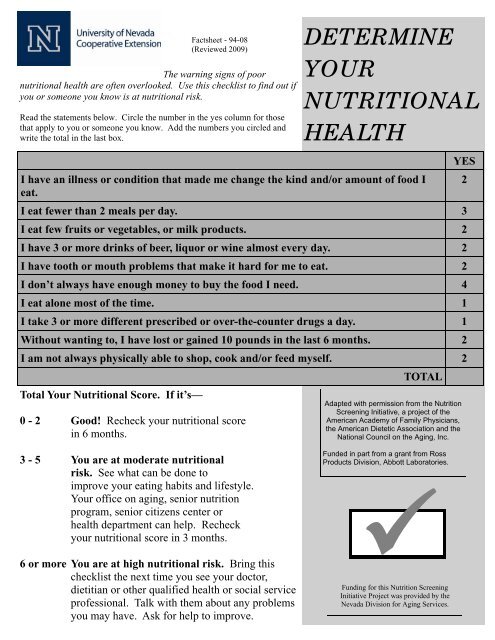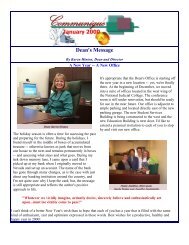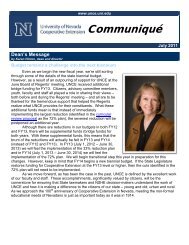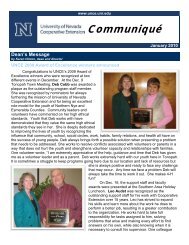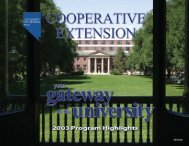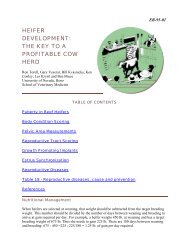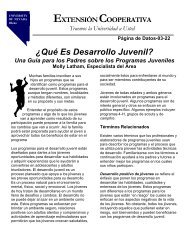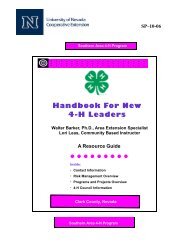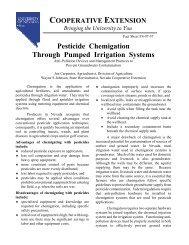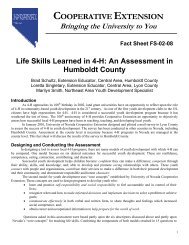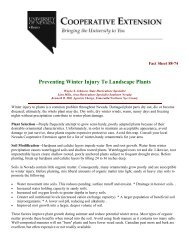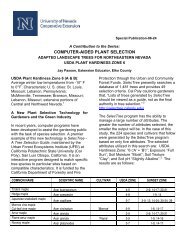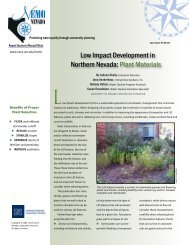Determine Your Nutritional Health - University of Nevada ...
Determine Your Nutritional Health - University of Nevada ...
Determine Your Nutritional Health - University of Nevada ...
Create successful ePaper yourself
Turn your PDF publications into a flip-book with our unique Google optimized e-Paper software.
Factsheet - 94-08<br />
(Reviewed 2009)<br />
The warning signs <strong>of</strong> poor<br />
nutritional health are <strong>of</strong>ten overlooked. Use this checklist to find out if<br />
you or someone you know is at nutritional risk.<br />
Read the statements below. Circle the number in the yes column for those<br />
that apply to you or someone you know. Add the numbers you circled and<br />
write the total in the last box.<br />
DETERMINE<br />
YOUR<br />
NUTRITIONAL<br />
HEALTH<br />
I have an illness or condition that made me change the kind and/or amount <strong>of</strong> food I<br />
eat.<br />
I eat fewer than 2 meals per day. 3<br />
I eat few fruits or vegetables, or milk products. 2<br />
I have 3 or more drinks <strong>of</strong> beer, liquor or wine almost every day. 2<br />
I have tooth or mouth problems that make it hard for me to eat. 2<br />
I don’t always have enough money to buy the food I need. 4<br />
I eat alone most <strong>of</strong> the time. 1<br />
I take 3 or more different prescribed or over-the-counter drugs a day. 1<br />
Without wanting to, I have lost or gained 10 pounds in the last 6 months. 2<br />
I am not always physically able to shop, cook and/or feed myself. 2<br />
TOTAL<br />
Total <strong>Your</strong> <strong>Nutritional</strong> Score. If it’s—<br />
0 - 2 Good! Recheck your nutritional score<br />
in 6 months.<br />
Adapted with permission from the Nutrition<br />
Screening Initiative, a project <strong>of</strong> the<br />
American Academy <strong>of</strong> Family Physicians,<br />
the American Dietetic Association and the<br />
National Council on the Aging, Inc.<br />
YES<br />
2<br />
3 - 5 You are at moderate nutritional<br />
risk. See what can be done to<br />
improve your eating habits and lifestyle.<br />
<strong>Your</strong> <strong>of</strong>fice on aging, senior nutrition<br />
program, senior citizens center or<br />
health department can help. Recheck<br />
your nutritional score in 3 months.<br />
6 or more You are at high nutritional risk. Bring this<br />
checklist the next time you see your doctor,<br />
dietitian or other qualified health or social service<br />
pr<strong>of</strong>essional. Talk with them about any problems<br />
you may have. Ask for help to improve.<br />
Funded in part from a grant from Ross<br />
Products Division, Abbott Laboratories.<br />
<br />
Funding for this Nutrition Screening<br />
Initiative Project was provided by the<br />
<strong>Nevada</strong> Division for Aging Services.
I have an illness or condition that made me<br />
change the kind and/or amount <strong>of</strong> food I<br />
eat.<br />
Changes in your eating habits make it<br />
difficult for you to get all the nutrients you<br />
need. Good nutrition helps the body resist<br />
diseases and recover more quickly if illness<br />
does strike.<br />
• Visit your physician regularly (at least<br />
once a year).<br />
• Avoid using vitamin and mineral<br />
supplements without medical advice.<br />
• Use medications only as directed.<br />
• Drink 6 to 8 glasses <strong>of</strong> water every day,<br />
even if you’re not thirsty.<br />
• Try to stay near your healthy body<br />
weight.<br />
• Stay physically active.<br />
I eat fewer than 2 meals per day.<br />
Eating only once a day makes it almost<br />
impossible to get the variety <strong>of</strong> foods and<br />
nutrients you need to stay healthy.<br />
• Try not to snack all day so you will be<br />
hungry at mealtime.<br />
• Eat at usual times since hunger pangs<br />
may not come. If necessary, set an<br />
alarm to remind you to eat.<br />
• Eat with friends or in a cheerful<br />
environment.<br />
• Cook meals ahead so that when you are<br />
too tired to cook, you only need to<br />
defrost or reheat your meal.<br />
• Keep easy to fix items (fruits, milk or<br />
yogurt, cereals, soups, cheese and<br />
crackers, peanut butter and whole wheat<br />
bread) on hand.<br />
I eat few fruits or vegetables, or milk<br />
products.<br />
Fruits and vegetables provide many important<br />
vitamins and minerals plus dietary fiber<br />
which is important for proper bowel function.<br />
Here are some tips to help you add fruits and<br />
vegetables to your daily diet.<br />
• Choose fruits for snacks between meals.<br />
• Use fresh or canned fruit slices as a<br />
colorful garnish for main dishes, salads<br />
and cereals.<br />
• Eat fresh fruits topped with yogurt or<br />
cottage cheese and sprinkled with<br />
cinnamon.<br />
• Blend fresh, frozen or canned fruit with<br />
milk for a fruit shake.<br />
• Top angel food cake with fresh, frozen<br />
or canned fruit.<br />
• Bake or broil apples, pears or bananas<br />
with cinnamon and nutmeg; fruit tastes<br />
even sweeter when eaten while warm.<br />
• Add vegetables to soups, stews or<br />
casseroles.<br />
• Mix several kinds <strong>of</strong> vegetables for an<br />
interesting medley.<br />
• Buy frozen vegetables in bags. You can<br />
use them as needed and store the rest<br />
for later use.<br />
• Use herbs and lemon juice to season<br />
vegetables.<br />
Milk products provide a variety <strong>of</strong> nutrients<br />
including calcium. A diet low in calcium<br />
may lead to osteoporosis which weakens<br />
bones and <strong>of</strong>ten leads to painful and disabling<br />
fractures. Below are some tips to help you<br />
increase the amount <strong>of</strong> milk products in your<br />
daily diet.<br />
• Add nonfat dry milk to soups, stews and<br />
casseroles.<br />
• Eat low-fat yogurt and cottage cheese as<br />
a snack or with meals.<br />
• Prepare canned soup with milk instead<br />
<strong>of</strong> water.<br />
• For calcium-rich desserts select ice<br />
milk, frozen yogurt, custards and<br />
puddings made with milk.<br />
• If you are unable to drink milk, consult<br />
with a physician or dietitian about your<br />
need for additional calcium.
I have 3 or more drinks <strong>of</strong> beer, liquor or<br />
wine almost every day.<br />
Many health problems become worse if you<br />
drink more than one or two alcoholic<br />
beverages per day. These problems may:<br />
‣ lead to malnutrition because you are<br />
replacing food with alcohol,<br />
‣ increase your risk <strong>of</strong> falls and<br />
accidents,<br />
‣ cause permanent damage to the brain<br />
and central nervous system and to the<br />
liver, heart, kidneys and stomach,<br />
‣ make it difficult for your doctor to<br />
diagnose certain medical problems,<br />
‣ mask pain that may otherwise serve<br />
as a warning sign <strong>of</strong> a medical<br />
problem such as a heart attack,<br />
‣ cause problems similar to dementia<br />
and confusion,<br />
‣ cause undesirable side effects when<br />
mixed with prescription and over-thecounter<br />
drugs.<br />
If you think alcohol may be a problem for<br />
you, seek help from a state or local social<br />
services agency.<br />
I have tooth or mouth problems that<br />
make it hard for me to eat.<br />
A healthy mouth, teeth and gums are<br />
necessary for eating. Missing, loose or<br />
rotten teeth or dentures which don’t fit well<br />
or cause mouth sores make it hard to eat.<br />
• Have regular dental checkups<br />
whether you have natural teeth or<br />
dentures.<br />
• Brush your teeth thoroughly at least<br />
twice daily.<br />
• Floss your teeth at least once daily.<br />
• Brush all denture surfaces with a<br />
denture care product each day.<br />
• To relieve dry mouth, drink extra<br />
water and avoid sugary snacks,<br />
caffeinated beverages, tobacco, and<br />
alcohol.<br />
If you have difficulty chewing:<br />
• Cook meat slowly in broth to make it<br />
tender.<br />
• Cut or chop meat into small pieces<br />
before you cook it.<br />
• Try s<strong>of</strong>ter meat substitutes such as<br />
beans, eggs, cottage cheese or cheese.<br />
• Try steaming vegetables so they are<br />
tender.<br />
• Chop vegetables so your teeth have<br />
less work to do.<br />
• Try putting vegetables in the blender<br />
or mashing them with a potato<br />
masher.<br />
I don’t always have enough money to buy<br />
the food I need.<br />
• Decide what foods you need<br />
BEFORE shopping, make a list.<br />
• Check the newspaper for “specials”.<br />
• Compare ads and clip coupons.<br />
• Compare prices between brands.<br />
• Loose-pack frozen fruits and<br />
vegetables allow you to remove a<br />
serving and return the unused portion<br />
to the freezer.<br />
• Buy whole chickens or roasts, which<br />
are usually cheaper, and cut them up<br />
yourself.<br />
• Take advantage <strong>of</strong> ‘economy’ packs<br />
<strong>of</strong> meat, poultry and fish. Wrap these<br />
in individual-size servings and freeze.<br />
• Shop with a friend. Share a head <strong>of</strong><br />
lettuce or a bunch <strong>of</strong> broccoli instead<br />
<strong>of</strong> letting it spoil in your refrigerator.
I eat alone most <strong>of</strong> the time.<br />
It is important that eating alone does not<br />
become an excuse for eating poorly.<br />
• Take turns eating with other single<br />
friends.<br />
• Prepare full recipes for casseroles or<br />
other dishes, freeze individual<br />
portions for later use.<br />
• Eat a meal or two at a community<br />
center for good food and<br />
companionship.<br />
• Eat near a window or with television,<br />
radio or reading material to enhance<br />
your meal.<br />
• Attend church or benefit dinners.<br />
• Ask your pastor for names <strong>of</strong> shut-ins<br />
who may enjoy company at meals.<br />
• Offer to help at a hospital or nursing<br />
home. Volunteers <strong>of</strong>ten receive meals<br />
for their services.<br />
• Treat yourself well. Would you be<br />
eating the same foods if you were<br />
cooking for a family?<br />
I take 3 or more different prescribed or<br />
over-the-counter drugs a day.<br />
Medications can cause dangerous drug and<br />
food interactions.<br />
• Always tell the doctor about past<br />
problems with drugs.<br />
• When starting to take a new drug, ask<br />
the doctor or pharmacist about the<br />
side effects that may occur.<br />
• Take the exact amount <strong>of</strong> any drugs<br />
prescribed by the doctor and follow<br />
the dosage schedule as closely as<br />
possible.<br />
• Ask your pharmacist or dietitian if<br />
you should avoid certain foods and<br />
beverages when taking any<br />
medications.<br />
• Never take drugs prescribed for<br />
someone else.<br />
• If you use more than one pharmacy,<br />
take all <strong>of</strong> your medications to one<br />
pharmacist to evaluate possible<br />
interactions.<br />
• Discard out-dated medicines.<br />
Without wanting to, I have lost or gained<br />
10 pounds in the last 6 months.<br />
Being overweight or underweight increases<br />
your chance <strong>of</strong> health complications. A<br />
sudden weight change may signal a health<br />
problem. You should seek immediate<br />
medical attention.<br />
I am not always physically able to shop,<br />
cook and/or feed myself.<br />
Impaired functional abilities may increase<br />
your risk <strong>of</strong> malnutrition.<br />
• If shopping is a problem, order foods<br />
from the local market by phone and<br />
have them delivered.<br />
• Call you local senior center or State<br />
Agency on Aging for information<br />
Prepared by: Mary Wilson, M.S., R.D., <strong>University</strong> <strong>of</strong> <strong>Nevada</strong> Cooperative Extension: Peggy Nipp, M.S., R.D. and Gwenn Snow,<br />
M.S.,R.D., Department <strong>of</strong> Nutrition, <strong>University</strong> <strong>of</strong> <strong>Nevada</strong>, Reno<br />
For more information, call Mary Wilson @ 702-257-5507.<br />
Copyright © 2008, <strong>University</strong> <strong>of</strong> <strong>Nevada</strong> Cooperative Extension.<br />
Adapted with permission from the Nutrition Screening Initiative, a project <strong>of</strong> the American Academy <strong>of</strong> Family Physicians, the American<br />
Dietetic Association and the National Council on Aging, Inc. Funded in part from a grant from Ross Products Division, Abbott Laboratories.<br />
The <strong>University</strong> <strong>of</strong> <strong>Nevada</strong>, Reno is an equal opportunity/affirmative action employer and does not discriminate on the basis <strong>of</strong> race, color, religion, sex, age, creed, national<br />
origin, veteran status, physical or mental disability and sexual orientation in any program or activity it operates. The <strong>University</strong> <strong>of</strong> <strong>Nevada</strong> employs only United States<br />
citizens and aliens lawfully authorized to work in the United States.


